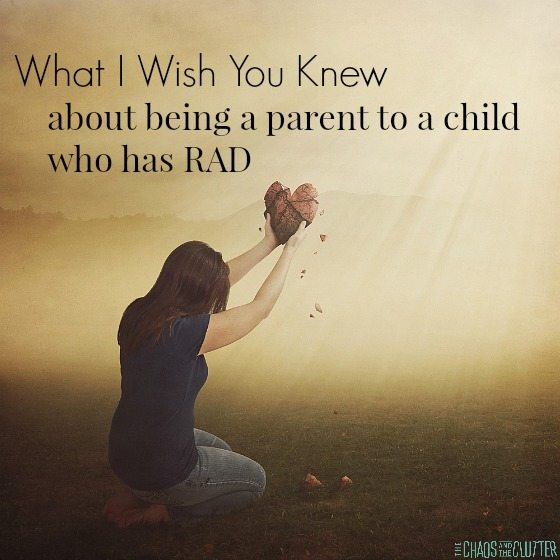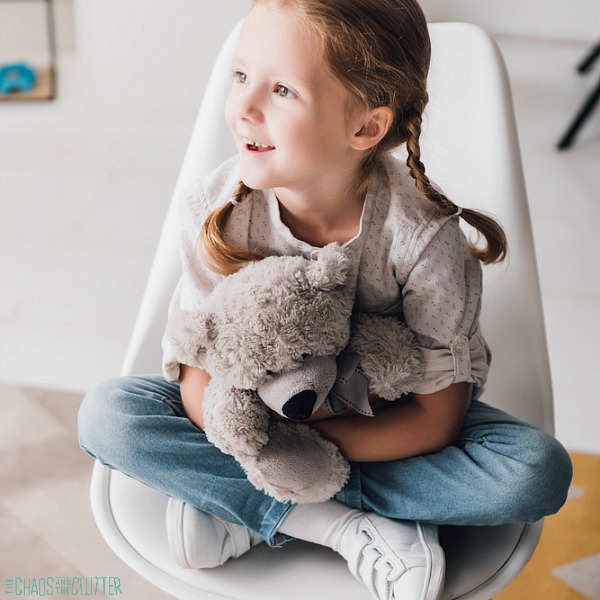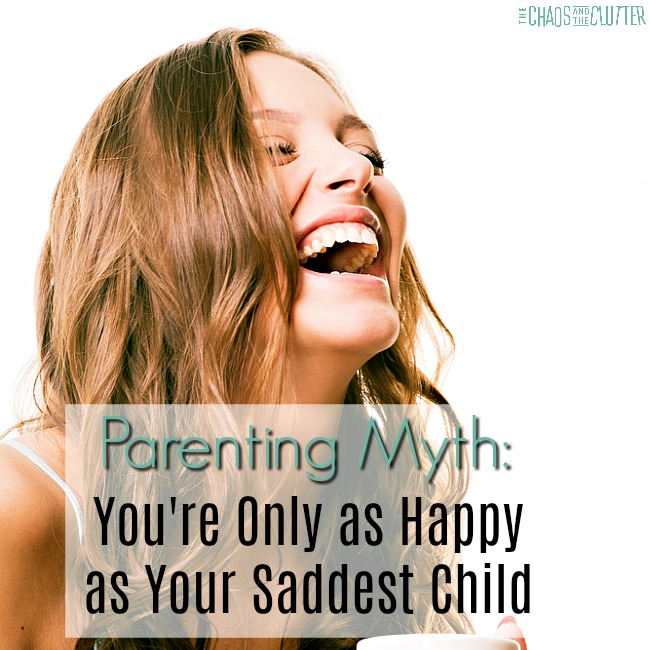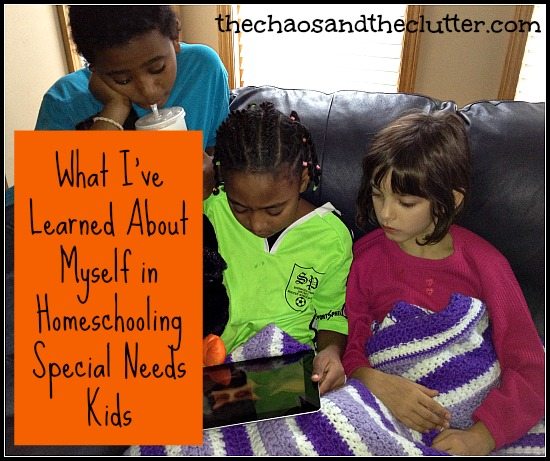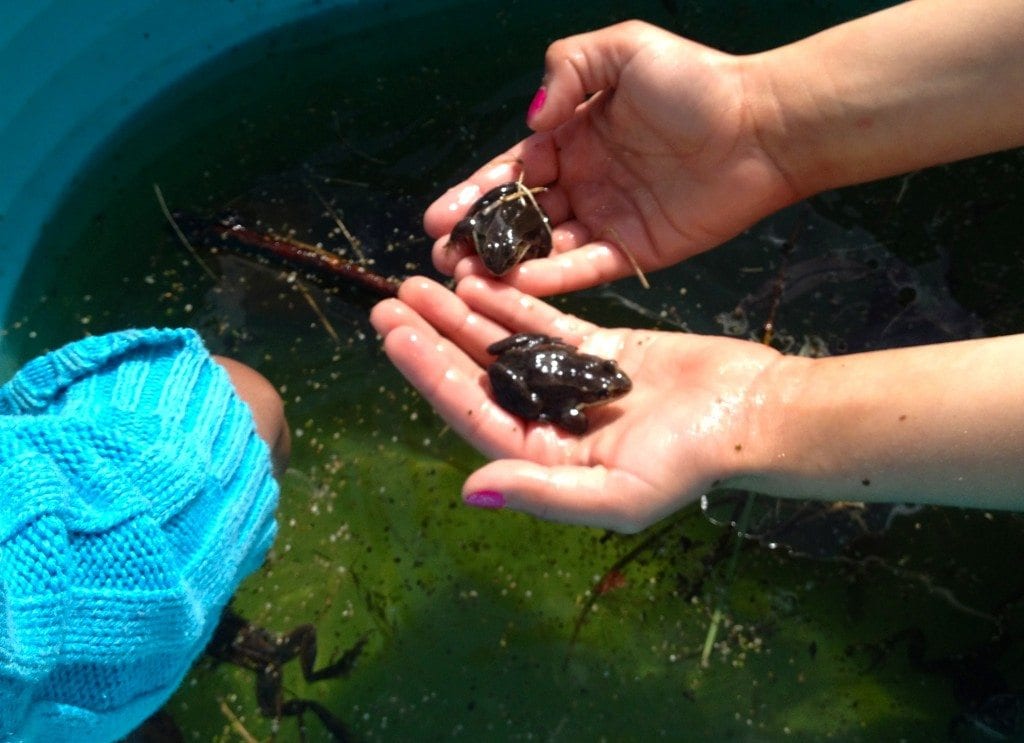Last week, we quietly admitted our daughter to a mental health treatment facility. I say “quietly” because we told very few people at the time. There was no Facebook announcement, no sendoff.
My friend Michelle sat beside me at intake where I shakily signed form after form. I was there for 5 hours learning more about the program and answering questions to help them better care for our daughter and then I walked out alone. I felt empty and scared.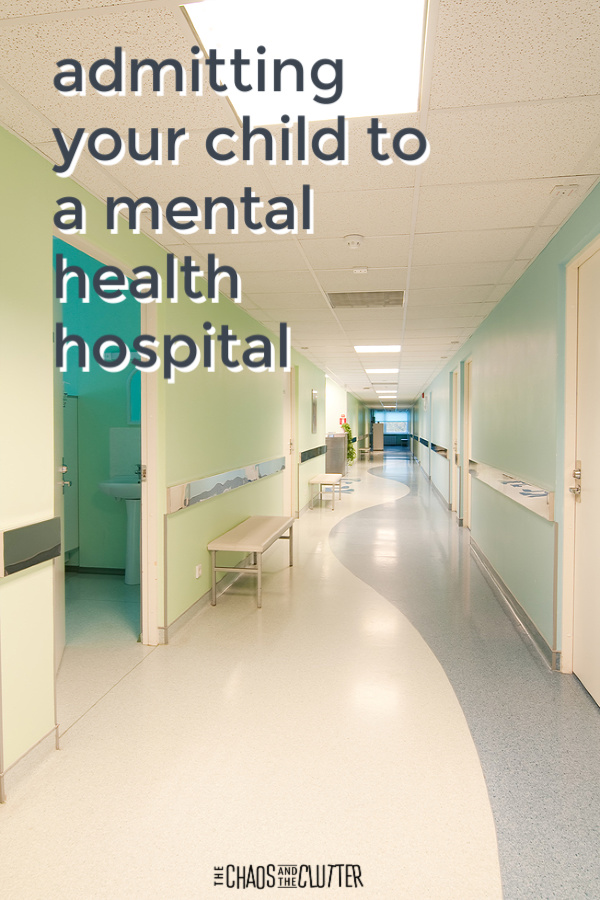 The decision to admit our daughter was not one we had arrived at lightly. In fact, the wait list for this particular program was about a year long, so we had had a lot of time to think and rethink our decision. No matter how conflicted we felt though, the bottom line remained the same: we had to give it a try. We were out of other options. We had tried medication, therapy, and outpatient treatment programs. She was suffering. Our family was hurting. We were all living in fear as she continued to decline. It was time.
The decision to admit our daughter was not one we had arrived at lightly. In fact, the wait list for this particular program was about a year long, so we had had a lot of time to think and rethink our decision. No matter how conflicted we felt though, the bottom line remained the same: we had to give it a try. We were out of other options. We had tried medication, therapy, and outpatient treatment programs. She was suffering. Our family was hurting. We were all living in fear as she continued to decline. It was time.
Our daughter has 3 mental health diagnoses. I’m choosing not to name them in this story because I don’t want this to just be about her and about us. My hope is that you see other stories in ours, to help you better understand and support families you may know who are facing this decision. Or perhaps you’ll see your own story in ours and feel less alone.
There is still such a stigma surrounding mental health. If our daughter had been diagnosed with Type 1 diabetes and she had to be hospitalized for a prolonged period until they could stabilize the disease and if during that time, we had to attend clinics on nutrition and lifestyle changes and information pertaining to her disease and treatment, no one would bat an eye.
We would have announced it on Facebook and put it in the prayer chain at church. There would have been an outpouring of casseroles and prayers and offers to help with our other kids.
But this isn’t the kind of thing that you announce on Facebook or tell people you run into. There is that protective feeling of wanting to shield her from judgment and scrutiny but a knowing that doing that also creates more shame around her disease.
We wrestled with our own feelings of embarrassment, guilt, and shame. We questioned “what could we have done differently?”.
We worry constantly that while almost all of our attention has been focused on the two of our kids with mental health issues, that a crisis could be building in one of our other kids and we may be missing it.
We feel like we are just doing triage, going from one literal crisis to another. It’s hard to even catch our breath.
This kind of life can be so isolating. There are things that have happened in our home that unless you are also walking this path of mental health disease in your children would shock you. My husband and I have literally said to each other, “who could we ever tell this to?”
Do you have any idea how isolating it is to live through “who could we ever tell this to?”? Who would be able to understand (and not judge) things that we can hardly even believe really happen?
Isolation can lead to feelings of hopelessness.
You need a village.
Just 4 days after our daughter’s admission, I found myself at a woman’s event at our church. In line at the buffet table, I answered “fine” to “how are you?” and “good” to “how are all the kids doing?” even though the truth was far from that.
The lie stung in my throat, making it hard to swallow.
Later that morning after the speaker had gone and the room cleared out, I was once again faced with “how are you?”
This time, there was no one else within earshot. I also knew the woman asking had gone through her own trials in life which made it feel safer to share mine.
As the story tumbled out, her eyes filled first with compassion and then with tears. She hugged me and we cried together. And then a magical thing happened. She pulled out her phone and pulled up her calendar and typed in our family’s name on her Wednesday afternoon and evening.
You see, I had shared that one of the many challenges we are now facing is that this program is super intensive and mandates that both parents attend parent sessions and family therapies and on Wednesdays, the time commitment works out to be 6 hours. Wednesday also just happens to be the hardest day for us to find child care for the other kids.
Here was this woman who was not just saying that she would pray for our family or would be “thinking of us”, but actually meeting a need, saying “my husband and I will be there this Wednesday and we will bring supper so you don’t have to worry about that”. What a gift.
You need a village. (worth repeating)
It’s only been a week, and already, we’ve needed to lean on our village.
That first admission day when my friend Michelle sat beside me? She did so much more than that. When I picked her up that morning, she presented our daughter with a gift and a card and these words: “Congratulations! I hear you got into an awesome school that’s super hard to get into and has a long waiting list. You are so lucky!” (all true)
She held us both up in that moment. Later, she took notes in the meetings. My brain wasn’t firing on all cylinders that morning due to the stress and I was sure I would forget important details. She took notes and remembered to ask things that had slipped my mind.
That same morning, one of our other daughters had woken up throwing up (from the stress) and my mom had come to our house to care for her. She also did laundry and changed our sheets. Do you know what a gift it was to crawl into fresh sheets that night after a long and emotional day?!
The night before the admission, we had a crisis here at home with our daughter. During that crisis, my neighbour offered to keep the other kids, to shield them from the worst of it, and to drive kids to and from piano and tutoring. Knowing that my other kids would be safe was also a gift.
Other friends took us out for supper the night of the intake. Honestly, we didn’t feel like going. We both just wanted to crawl into that bed with the fresh sheets and sleep for years. But we had committed and so we went and we ate good food and we were held up by people who loved us and after awhile, we even found ourselves laughing and almost forgetting. Another gift in the midst of such pain.
Is a mental health hospital the right place for your child?
Mental health hospital admissions are all different. For some, it may be an emergency safety admission that lasts for one or two days until the imminent threat has passed. For others, it may be a 30 or 90 day stay.
Our daughter’s program is 4-5 months where she stays at the hospital Monday to Friday and attends school, art therapy, music therapy, group therapy, animal therapy, and family therapy on site and is home on weekends with specific goals to work on at that time. Her program requires an intense commitment from both parents both in time and energy and an even more intense commitment from her.
And when her program ends, that is really only the beginning of the journey for us. We still have a long ways to go.
Perhaps you have come to a place where you find yourself at what feels like the end of the road in your child’s mental health journey. You don’t know what more can be done at home to keep them safe and healthy. Your family is fraying.
You walk around on eggshells every day, worried about what may set your child off. Or perhaps you hardly sleep at night worried that they may harm themselves or others.
I am not a professional and this advice is not meant to replace medical advice. You should always consult with a qualified mental health professional before making these decisions. 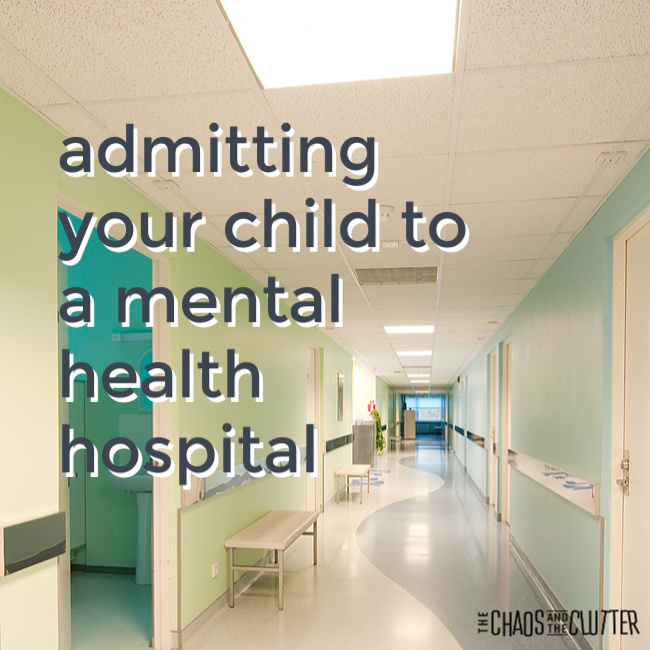
When to consider admitting your child to a mental health hospital:
- they are unsafe at home
- they are a risk to themselves or others
- they are under the care of a psychiatrist and/or therapist but are still not stabilizing
- the family is not able to manage their symptoms at home
- even working with professionals, you still cannot find the right medications or dosing
- you or other family members are living in fear
- your child expresses thoughts of or plans for suicide or attempts suicide
- addiction
- upon recommendation of your child’s doctor, psychiatrist, or therapist
Some of the symptoms/diagnoses that MAY require treatment at a mental health facility:
- suicidal ideation, suicide attempts
- self harm
- violent rages
- inability to cope with life
- eating disorders
- severe mood swings
- depression
- debilitating anxiety
- reactive attachment disorder
- post traumatic stress disorder or developmental trauma disorder
- obsessive compulsive disorder
- bipolar disorder
- schizophrenia
- substance abuse or addiction
- Tourette’s
- autism
- oppositional defiance disorder
- attention deficit hyperactivity disorder
- conduct disorder
Remember that a stay at a mental health facility is one tool that patients and their families can use. It does not create a cure, but it can be the beginning of more stability in the mood disorder or mental illness.
How to be the village:
- Act the same way you would if their child had had to go into the hospital for a serious physical illness.
- Show up. Just sit there. Be present.
- Affirm that this decision must be so hard but that you know they love their child and that this is what their child needs right now. Parents carry so much guilt. They need to be reminded that they are good parents, willing to do hard things like sending their child to get the right help, even when all their instincts as a parent scream at them to keep their child close.
- Take their other children for play dates, outings, or activities so that the parents can rest. They will typically crash physically and emotionally for at least a few weeks, possibly even months depending on what led up to the hospital admission. Having time to be alone and rest will help them to heal faster.
- Do something kind for the other kids. Bring a small gift, especially something like a craft or activity they can do. Spend time listening to them or playing a board game or Lego with them. They have likely been getting less than their share of attention in recent months as their parents have had to put the sick sibling at the top of the time and attention list. Siblings can carry their own worry and feelings of guilt.
- Bring healthy food. Snacks, meals, or gift cards for restaurants or take-out. And remind them to eat.
- If they are married, help them protect their marriage in the crisis by watching the other kids for them to have date nights, by encouraging their relationship, and by giving them opportunities to spend time with other couples.
- Sit and have tea or coffee with them. Let them cry and express all kinds of feelings. Regret, sorrow, relief at the new peace in their home, fear because the peace is temporary, dread about the future.
- Or just watch TV with them or take them to a movie or invite them to dinner. Sometimes it’s also nice not to talk about it.
- Offer to attend important appointments to take notes or hold their hand and debrief afterwards.
- Pray for them.
- Help them research. It is beyond exhausting to try to find programs and services and funding and these families are having a hard enough time just getting through each day. Help them research or make calls or fill out forms. There are so many forms.
- Serve them in practical ways. Laundry, housework, errands, house repairs. Dishes still pile up even when it feels like the world is crumbling down.
- Drop off comfort items. Chocolate or coffee or wine or whatever their comfort thing is.
- Send gas or grocery gift cards or cash. Having a family member in the hospital often means time off work, parking fees, extra driving, and additional expenses. There can also be a high cost for the treatment program and medications.
- Remind them that you are thinking of them and that what they are doing to fight for their child’s health does not go unnoticed.
If you are walking this road yourself, I’m thinking of you. It’s sure not an easy one. It’s likely not one you ever imagined when you began your parenthood journey. I know I didn’t! Please know that you are not alone.
Join me for a free 5 part email series, Little Hearts, Big Worries offering resources and hope for parents.
You may also want to read:
Let’s Talk Childhood Mental Illness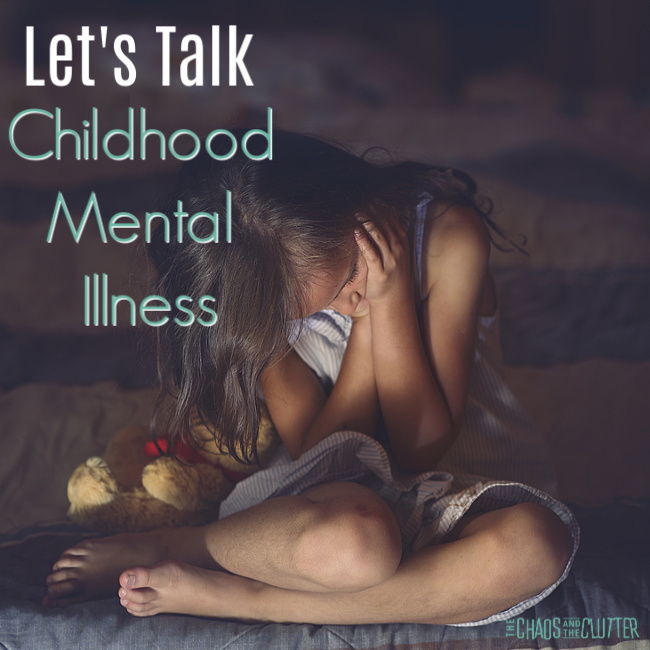
The Waves of Grief in Special Needs Parenting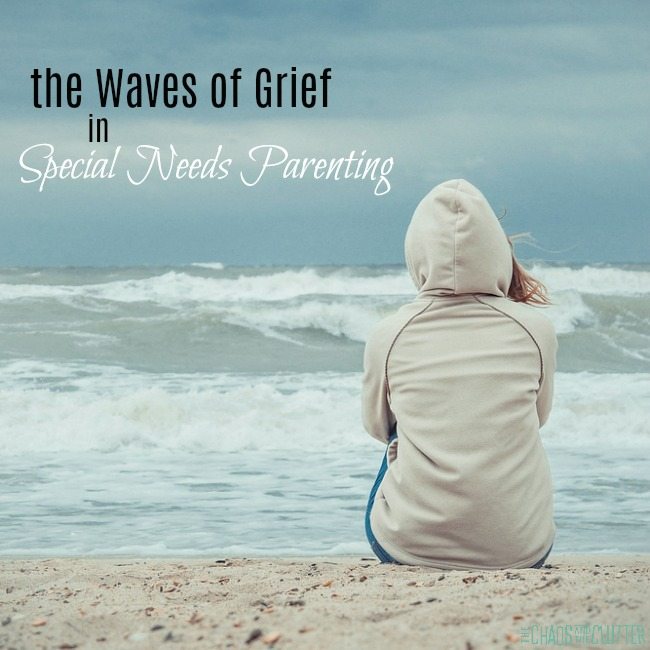
What I Wish You Knew About Parenting a Child with Reactive Attachment Disorder